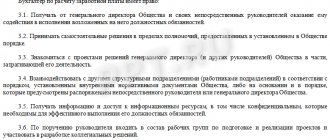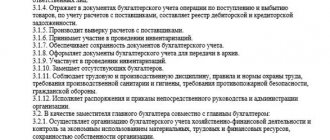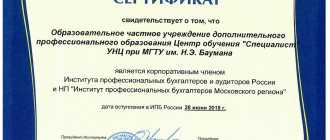Employers had until the end of 2021 to complete drawing up action plans for the implementation of professional standards. In particular, they should have established for which positions professional standards have been adopted, which employees meet their requirements, and who needs to be sent for training. Of particular interest is the position of chief accountant, which exists in almost every organization. But, as practice shows, many of the chief accountants, although they have extensive work experience, work as chief accountants without higher education. Is it necessary to fire such an employee because of this? Let's figure it out.
Who is an accountant
The profession of an accountant is in great demand, the salary in Russia is in the range of 15,000–80,000 rubles (median value), is available to men and women at any age (pass the test to become an accountant), requires college education or accounting courses, several career scenarios are possible. The profession of an accountant has its pros and cons.
Any organization has an accountant, and in large ones there are even several - one for each area: accounting for company funds, settlements with suppliers and customers, payroll, tax deductions, etc. The state obliges the company to maintain accounting records and report to it. The state, represented by the tax inspectorate, pension and other funds, comes to check whether the company is paying taxes and contributions to the state correctly.
By the way! You can also look at our accountant resume sample.
How to apply the professional standard
This regulatory document mentions two positions:
- Chief Accountant;
- accountant.
The said standard defines common features for both of them. At the same time, it is clearly indicated what exactly a specialist must be able to do in order to implement the tasks facing him.
Any interested accountant can easily find a sample of the professional standard in question, so there is no point in presenting it in this article. One has only to point out certain nuances that can easily escape attention.
What does an accountant do?
- Creates accounting documents (invoices, invoices, invoices, cash receipts, payment orders for the bank and others) and calculates taxes, and also sends them through the bank to the tax office;
- He makes payments through the bank in favor of other companies with which this company cooperates;
- He reports to the state, drawing up a balance sheet for the tax office and reports to public funds;
- Pays wages to employees of the organization;
- Maintains the cash register and related documentation.
Is it necessary to comply with the Standard?
State bodies, public and non-public joint stock companies, banks, insurance companies, non-state pension funds and a number of other organizations are required to obey the norms of the Professional Standard.
If it is a private entrepreneur or a company registered in the form of an LLC, then it is not yet necessary for it to comply with the requirements of the Standard. Let’s emphasize “for now.”
Because very soon the legislator will introduce Article 195.2 into the Labor Code of the Russian Federation, where he will describe the status of professional standards. And then the employer will begin to hire only those specialists whose education and skills meet the requirements of these documents.
Accountant career
An ordinary accountant can become a deputy chief accountant, and then a chief accountant (chief accountant) of a company and even a financial director. True, for such growth he will need special education. The chief accountant no longer conducts individual sections of accounting; he develops the entire accounting policy of the accounting department and creates balance sheets for the tax office. The chief accountant monitors current changes in tax legislation and he must correctly calculate taxes and other payments to the state. He is responsible for the entire accounting department. The chief accountant is the second person after the general director in the company.
Education and work experience
In particular, it is assumed that secondary specialized education is quite sufficient for an accountant. However, only those specialists who have three years of experience in the field of accounting and control can hold positions. Persons with incomplete higher education cannot work in their profession. Professional development of specialists takes place in accordance with relevant programs.
A chief accountant without a university degree is allowed to hold a position only if his specialized experience is at least 5 years over the last seven years.
Accountant training
Courses
IAEO (International Academy of Expertise and Evaluation) (remotely)
In this course, you can obtain the profession of an accountant remotely in 3 months and 15,000 rubles: - One of the most affordable prices in Russia; — Diploma of professional retraining of the established form; — Training in a completely distance format; — Certificate of compliance with professional standards worth 10,000 rubles. For a present! — The largest educational institution of additional professional education. education in Russia.
CHTA (Modern Science and Technology Academy) (Remotely)
Distance learning at the Modern Scientific and Technological Academy (SNTA) under professional retraining programs in the field of “Accounting” will allow you to obtain a new specialty and receive a state diploma. Having any prof. education, you can get a real accounting diploma in 3 months.
ProductStar
You will learn how to effectively use financial statement data to improve a company's business performance. You will learn how to create a financial model of a business and analyze a budget, analyze a company’s cash flows and manage financial risks. You will be able to reach a new level of qualifications and get a promotion. What you will learn: Learn the basic principles of financial analytics; Skills for financial analysis tasks, competency matrix and personal growth areas; Learn how to build a financial analysis system; Basic financial analysis reports, reporting tools, monitoring financial indicators and analytics; Planning and budgeting; Main types of financial statements, comparison and evaluation of financial statements of different companies; Product approach to Finance tasks; Unit economics in comparison with PL, step-by-step construction and implementation of financial analytics systems, approaches to working with business requirements;
Russian Institute of Professional Education "IPO"
Russian Institute of Vocational Education “IPO” is recruiting students to obtain the specialty “Accountant” through a distance program of professional retraining and advanced training. Studying at the IPO is a convenient and quick way to receive distance education. 200+ training courses. 8000+ graduates from 200 cities. Short deadlines for completing documents and external training, interest-free installments from the institute and individual discounts. Contact us!
Prestige (Moscow) (88 hours (2 months))
Moskovsky conducts additional education courses. You will acquire good initial knowledge necessary for maintaining independent accounting for a small and medium-sized enterprise: theoretical and practical fundamentals of accounting, basic bank transactions and accounting for supply, production and sales processes, “1C: Accounting”. Monthly payment.
Universities
Moscow Humanitarian University, Moscow State University
Enterprise Economics (Faculty of Economics, Management and International Relations)
National Research Technological University "MISiS"
Economics (Institute of Economics and Industrial Enterprise Management)
National Research University "MPEI"
Economics (Engineering and Economic Institute of the National Research University "MPEI")
Moscow Technical University of Communications and Informatics
Economics (Correspondence General Technical Faculty of MTUCI)
Autonomous non-profit organization of higher education "Institute of Continuing Education"
Economics in construction and housing and communal services (Autonomous non-profit organization of higher education “Institute of Continuing Education”)
Knowledge
The new professional standard has significantly raised the bar of requirements for the work of an accountant in general, and his level of knowledge in particular. The thing is that the new legislation introduces a number of rules regarding the procedure for maintaining records and preparing reports, which has significantly complicated the work.
In addition, it is assumed that a specialist, depending on his official position, will be able to determine for himself personally which areas are most important for him, and in the future improve his qualifications accordingly.
In particular, it would be advisable for an ordinary accountant to study the basics of legislation relating to archiving, social and health insurance. Knowledge in the following legal areas will not be superfluous:
- customs;
- labor;
- civil.
At the same time, the professional standard indicates that an accountant should not understand IFRS. A logical conclusion follows from this: organizing accounting based on international requirements is not a mandatory requirement. But the tasks of the chief accountant include the generation of generalized reporting, including according to IFRS, based on information prepared by ordinary specialists according to national standards.
At the same time, an important responsibility of an accountant is to be able to determine the cost of certain works and services produced or provided by an economic entity. Such calculations require familiarity with industry-specific regulations.
The chief accountant, for his part, must have knowledge related to the practice of legal proceedings within his circle of responsibility. At the same time, experts point out that it would be much more correct to oblige them to study the arbitration procedure, since this is much more necessary when tax disputes arise.
In addition, the professional standard does not imply easing the requirements for accountants collaborating with small firms operating under special fiscal regimes.
Underwater rocks
And now the accountant has improved his professional level, provided documents to the employer if necessary, and is confident that his professional skills correspond to the position he holds. But it’s too early to put an end to this. When applying for training, the accountant draws up an agreement with the training center, which specifies the amount of training (it can be divided into monthly payments) and additionally pays the membership fee to the IPB of Russia. The professional accountant will make this contribution annually . Timely payment of membership fees is a mandatory condition for membership in the IPB of Russia. In addition, you will need to annually improve your professional level by at least 40 hours of study.
The membership fee to the IPB of Russia is about 2 thousand rubles per year (starting from the second year). However, there is a big plus here; the Institute of Professional Accountants provides access to a special resource, which stores a large amount of information useful for the Chief Accountant. That is, there is no need to spend on benefits or training manuals.
When undergoing professional education, an accountant:
- Becomes a more valuable specialist in the eyes of the employer and colleagues;
- Is more competitive in the labor market;
- Can apply for higher wages;
- You will be confident if the employer decides to check the qualifications of employees.
The work of an accountant requires constant reading of professional literature and articles, but you should also not forget about the advantages of education: it gives you the opportunity to take a broader look at the profession, get out of your usual way of life and thinking, and also meet new smart, motivated, professional people.
Our assessment of the profession
7
Demand
10.0/10
Salary
6.0/10
Is it “easy” to get a profession?
6.0/10
Kudos
7.0/10
Career
6.0/10
The accountant profession occupies a leading position in demand, since any company needs competent and experienced specialists in this field. The responsibilities of an accountant are varied and are formed based on the company’s activities, staff and a number of other important features. A specialist of any category is responsible for his work, both before the management of the organization and at the legislative level.









